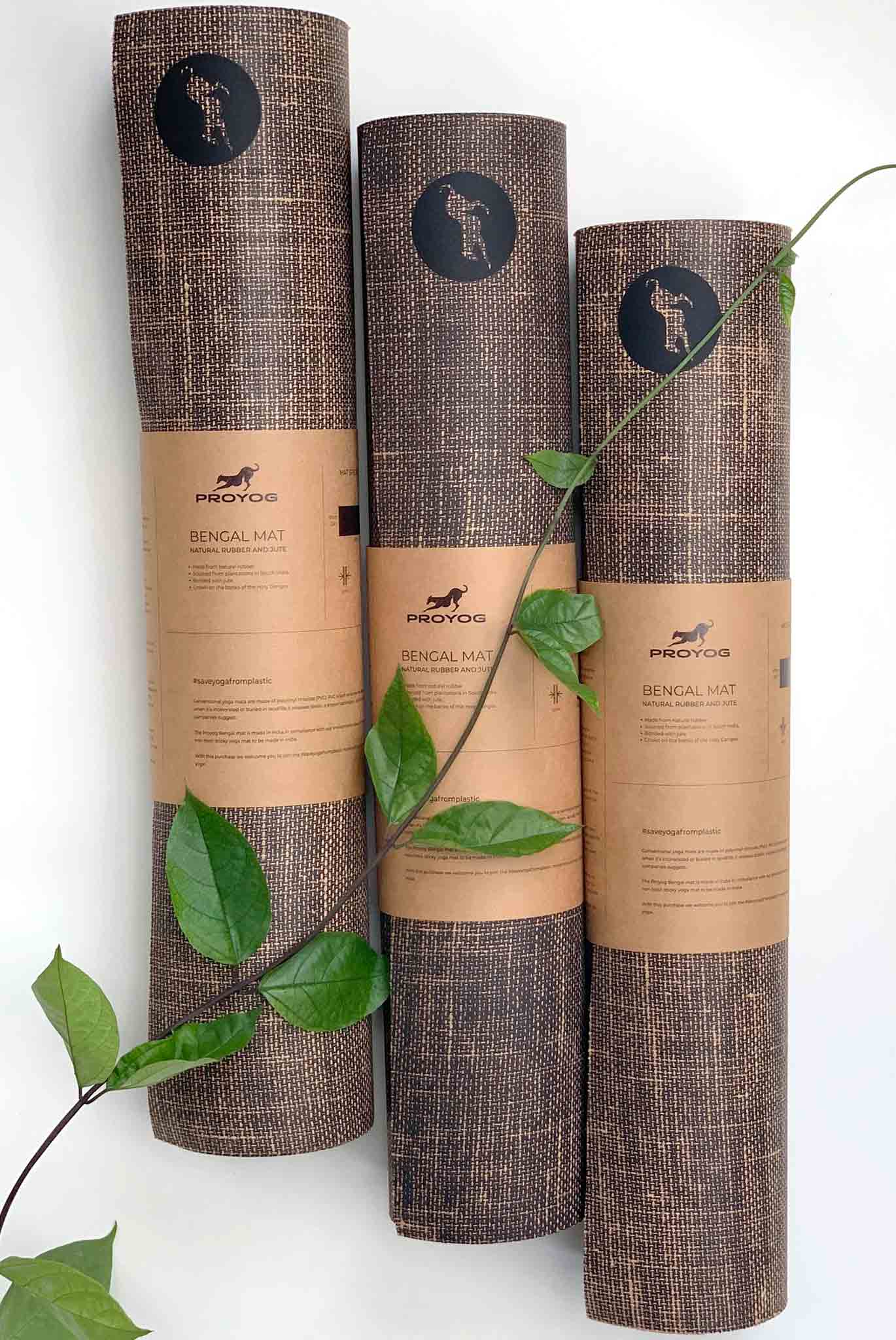Introduction
While yoga is often celebrated for its mental and physical benefits, the primary accessory used—the yoga mat—might carry hidden health risks. This piece explores these potential hazards associated with certain types of yoga mats and introduces alternatives to maintain a healthy, beneficial practice.
Health Risks of PVC Yoga Mats:
Many mats particularly those made from polyvinyl chloride (PVC), boast durability and superior grip. However, these benefits are overshadowed by their chemical makeup, including phthalates and biphenyl A (BPA), which render the plastic flexible.
Known for being endocrine disruptors, these chemicals are linked to several health concerns like hormonal disturbances, reproductive issues, and a heightened risk of cancers.
Evidence of Health Risks from Scientific Research
Recent studies, including a pivotal 2021 investigation published in SPE Polymers, have documented the presence of detrimental chemicals in PVC yoga mats. The risk is especially pronounced in heated environments such as hot yoga studios, where the elevated temperatures can cause these toxins to vaporise into the air, increasing exposure.
Dr Jagadish Hiremath, medical director at Aasra Hospitals, asserts, “Many traditional yoga mats are made from polyvinyl chloride (PVC), which often contains chemical additives such as phthalates and bisphenol A (BPA). (Source: Freepik)
Does your yoga mat pose risks to your health, impacting your hormones and general well-being? According to Warren Phillips, a scientist and content creator, the answer might be yes.
To avoid potential hazards, the best way to choose yoga mats is made from natural and non-toxic materials such as cork, natural rubber, or organic cotton.
These materials are safe It benefits both the environment and human health, offering a non-toxic surface for yoga practice. Additionally, it’s important to regularly clean and maintain yoga mats to prevent the build-up of bacteria, mild, and other potential health hazards.
Healthier Alternatives to PVC Mats
In light of these risks, many yoga practitioners are opting for more sustainable and safer mat options:
1. Natural Rubber Mats:
Derived from rubber tree sap, these mats are both biodegradable and devoid of harmful chemicals like PVC, phthalates, and BPA, offering a robust grip and cushioning suitable for various yoga styles.
Yogikuti Yoga Mat:

A natural yoga mat is made from a natural tree rubber base that ensures it sticks to the floor and does not bunch up when doing your poses.
Unique Features:
Crafted from cork and natural tree rubber materials.
Featuring a 1 mm cork top and a 3 mm natural tree rubber base for enhanced cushioning, safety, and comfort.
Includes clear, printed guide marks to assist with alignment and enhance your yoga practice.
Offers a wider and longer design compared to standard-size yoga mats, providing ample space for comfortable practice sessions.
Proyog Yoga Mat:

Crafted with natural rubber and jute,
it’s designed to extend the life of your mat while keeping it fresh longer.
Enjoy a perfect non-slip grip for you
MATERIAL & FEATURES
- Made with Jute and Natural Rubber.
- It has a perfect non-slip grip.
- Completely devoid of any detrimental toxins and chemicals.
- Weight approx.: 2.3kgs.
- Size: 61cm(24”) x 183cm(72”) x 3mm.
Cockatoo India

Cockatoo Super Premium 5.5 MM Pure Natural Rubber Yoga Mat: Non-Slip,
Sweat Absorbent,
Ideal for Women and Men,
Includes Cover Bag L-185CM x W-68CM
MAIN FEATURES:
- Non-Slip Feature: Eco-PU top ensures superior grip, while the 100% natural rubber base remains steadfast without slipping, shifting, or sliding.
- Optimal Cushioning: The natural rubber base offers a perfect. combination of comfort, balance, and stability.
- Sweat Absorption: The open-celled top layer absorbs sweat, providing a reliable grip even during intense workout sessions.
- Longer & Wider: Longer 185 CM and wider 68
- CM, than most standard mats, provides ample room to stretch
- Consciously Created: Biodegradable natural rubber & recycled PU. No latex, PVC, or toxic glues
Only Yoga Mat -Play Back Yoga Mat
Mats are made from environmentally safe natural rubber or trees.
Only yoga mat with an all-over pattern on one side. Non-slip surface. Thickness 5mm. Width 62.5cm. Length 182cm.
Fabric Thermoplastic Polyurethane
Pattern Plain Coloured
Occasion Casual
Care Instructions: Wipe with a clean, dry cloth as required.
Model Information Height – 175 Cm / 5’8″. She Is Wearing Size S.
Matsu Living
Matsu Mudra is our 100% Eco-friendly and Natural Jute yoga mat. It is a one-of-a-kind mat curated by the Yogis for the Yogis. Crafted for your ultimate …
DESCRIPTION
Matsu Mudra is our 100% Eco-friendly and Natural Jute yoga mat. It is a one-of-a-kind mat curated by the Yogis for the Yogis.
Designed with your utmost comfort in mind, our Natural Jute yoga mats feature a herringbone weave pattern for enhanced durability. These mats are versatile and suitable for power yoga or Astana practices and gentle exercises.
Key Features:
– Outstanding grip
– Anti-skid properties
– Ideal for Power Yoga
– Firm grip
Other Details:
Material Herringbone weaving on Jute with natural plant rubber.
Size 6.50 ft. X 2.25 ft.
Weight 2 kg
- Cork Mats:
Known for their sustainable qualities and natural resistance to microbes and odors, cork mats improve damp grip and are ideal for sweat-inducing yoga.
- Organic Cotton Mats:
Soft and non-slip, organic cotton mats provide a hypoallergenic surface and are washable, synthetic-free, and fully biodegradable, making them an excellent choice for those with sensitive skin or allergies
Conclusion
Prioritizing health within your yoga practice involves more than just routine exercise; it requires critically examining the tools, including the yoga mat. By selecting safer, more eco-friendly alternatives, yogis enhance their health benefits and contribute to a broader movement towards sustainability and mindful practice.
Choosing a yoga mat goes beyond personal comfort and extends to environmental impact considerations and potential health implications. Certifications such as Oeko-Tex Standard 100 and GOTS (Global Organic Textile Standard) can guide consumers toward mats free of hazardous substances.

